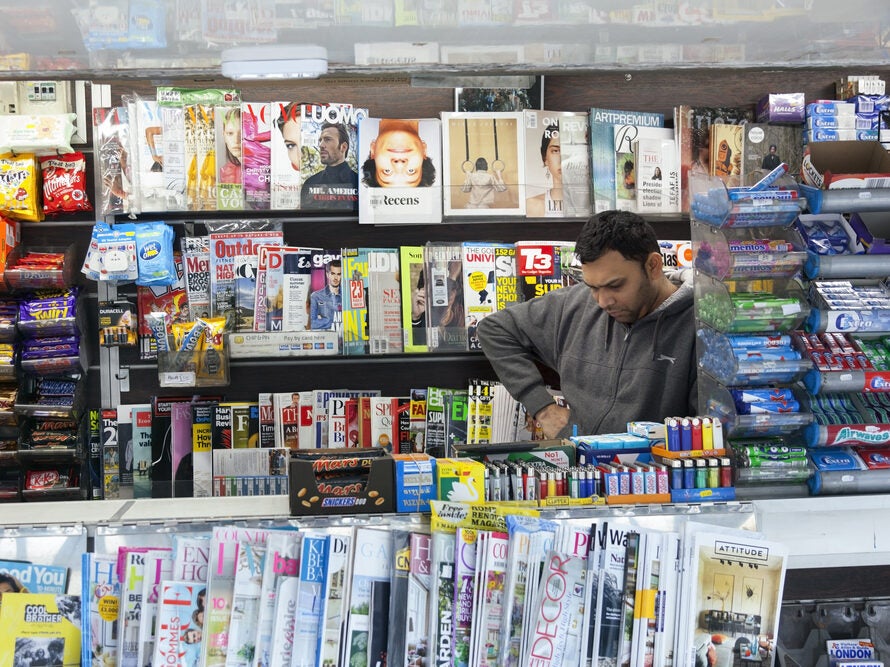
The Federation of Independent Retailers has again raised the prospect that its members may stop stocking some newspapers after The Guardian raised its weekday cover price to £2.80 but lowered the margin kept by newsagents.
It is the third time since December that the trade body, which represents more than 10,000 businesses including newsagents, off licences and post offices, has made the suggestion in public statements.
Newsagents receive between a sixth and a quarter of the cover price of each newspaper they sell. However, almost all national newspaper publishers have lowered these proportions over the past decade as they have simultaneously raised cover prices.
Press Gazette research in January revealed how UK national newspaper cover prices have sharply increased in the last decade as publishers have sought to counter the impact of falling advertising and increased newsprint/distribution costs.
The most recent warning from the FIR was prompted by news that Guardian News and Media plans to raise the price of the daily and weekend Guardian, as well as The Observer, by 30p per copy to £2.80 and £3.80 respectively while cutting the percentage margin for newagents to 21.5%.
The federation’s national president Jason Birks said: “Neither retailers nor their customers will take this news well. For retailers, this could mean reviewing the profitability of selling the Guardian against other product categories and for customers, it could mean buying the paper on fewer days of the week.
“Given the low circulations of the Guardian and Observer, this is a risky strategy indeed, which is why I have written to [GNM chief financial and operating officer Keith] Underwood.”
The Guardian has responded by encouraging stockists to enrol in its "Enhanced Margin Uplift" scheme, which boosts the amount they earn when selling papers to Guardian and Observer subscribers. The company said it believes the scheme "will mean that we pay one of the highest margins in the market to retailers".
In March, DMG Media announced that the retail margin for the Daily Mail would drop to 21.8%, prompting Birks to say he believed that “some members may consider delisting the product and, indeed, whether they continue selling newspapers because their hard work that has kept the news industry afloat for years is neither recognised nor appreciated”.
And in December the Fed criticised both DMG Media and Reach over margin drops. DMG Media decreased the retail margin for the Mail on Sunday and the Saturday edition of the Daily Mail to 20.5%, while Reach lowered the margin across its titles to “an all-time low” of 18.5%.
“Reducing margins to a measly 18.5% will simply speed up the decline of the industry, as news retailers downgrade newspaper displays in their stores and look to other categories that demand less work but where there are greater rewards,” Birks said.
In 2013 three weekday newspapers – the i, The Times and the Racing Post – offered 25% margins to newsagents. Today the highest margin offered, by the i, is 22%.
The only paper not to have lowered its retailer margin over the past decade is the Financial Times, which still offers stockists 20% of the cover price.
As newspapers’ cover prices have risen, so have the amounts of money retailers earn per paper sold. However, the decreased margins mean they earn less than they would have otherwise.
For example, the Racing Post, which nets newsagents the most pence per copy of any weekday daily newspaper, used to earn retailers 50p a copy. It now generates 88p a copy. If the newspaper had kept its 2013 margin of 25%, each copy of Racing Post sold would earn a retailer £1.13.
Some regional publishers have kept margins steady, with National World for example announcing cover price increases in December without dropping retail terms. And in August last year, the Fed praised DMG Media for (at the time) keeping its retail margins the same while increasing the Daily Mail cover price.
The organisation has painted a picture in its statements of news stockists losing patience with publishers who, to their minds, are not compensating them adequately for the support they give to print. After the Mail announced its New Year price rises, Birks said: "Such penny pinching at a time usually associated with giving is despicable. Times are incredibly tough for independent retailers, amid the cost-of-living crisis, supply issues and soaring energy bills...
“After giving these titles many years of support, this is a massive kick in the teeth for independent retailers. Our members want to actively promote print to their readers but must be properly rewarded for doing so."
A spokesperson for DMG Media declined to comment for this article. A Guardian News and Media spokesperson said: "In common with many industries right now - print publishers are experiencing significant rises in the cost of producing, printing and distributing newsprint. Increasing the retail cost of the Guardian newspaper means that we can continue investing in impactful journalism and a great print product.
“We encourage retailers to join the Guardian's Enhanced Margin Uplift scheme (EMU). The EMU rewards retailers who are supporting our subscription scheme and digital vouchers, enabling them to earn more for every copy of the Guardian and Observer sold to our readers who are print subscribers. We'll be providing support and materials to promote these subscriptions in retail stores, and are making the scheme easy to join so that retailers can quickly start to receive the additional margin. We believe the scheme will mean that we pay one of the highest margins in the market to retailers through the week and across the weekend.
"Our aim is to be as open as possible with retailers about our decisions and how it impacts their business and how our product compares to others so we provide as much information as possible when things change."
Email pged@pressgazette.co.uk to point out mistakes, provide story tips or send in a letter for publication on our "Letters Page" blog
